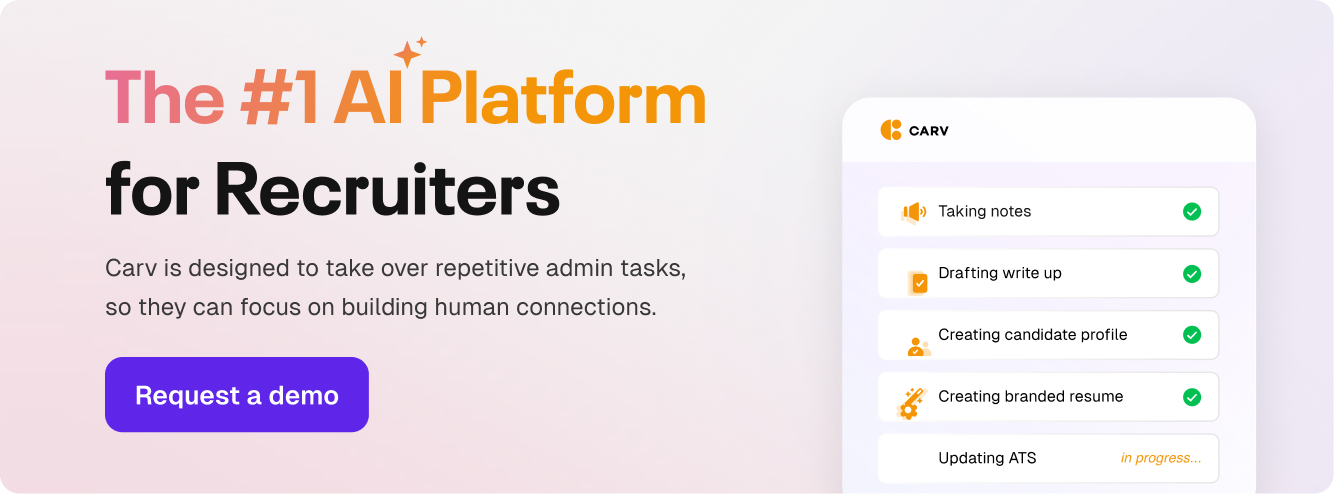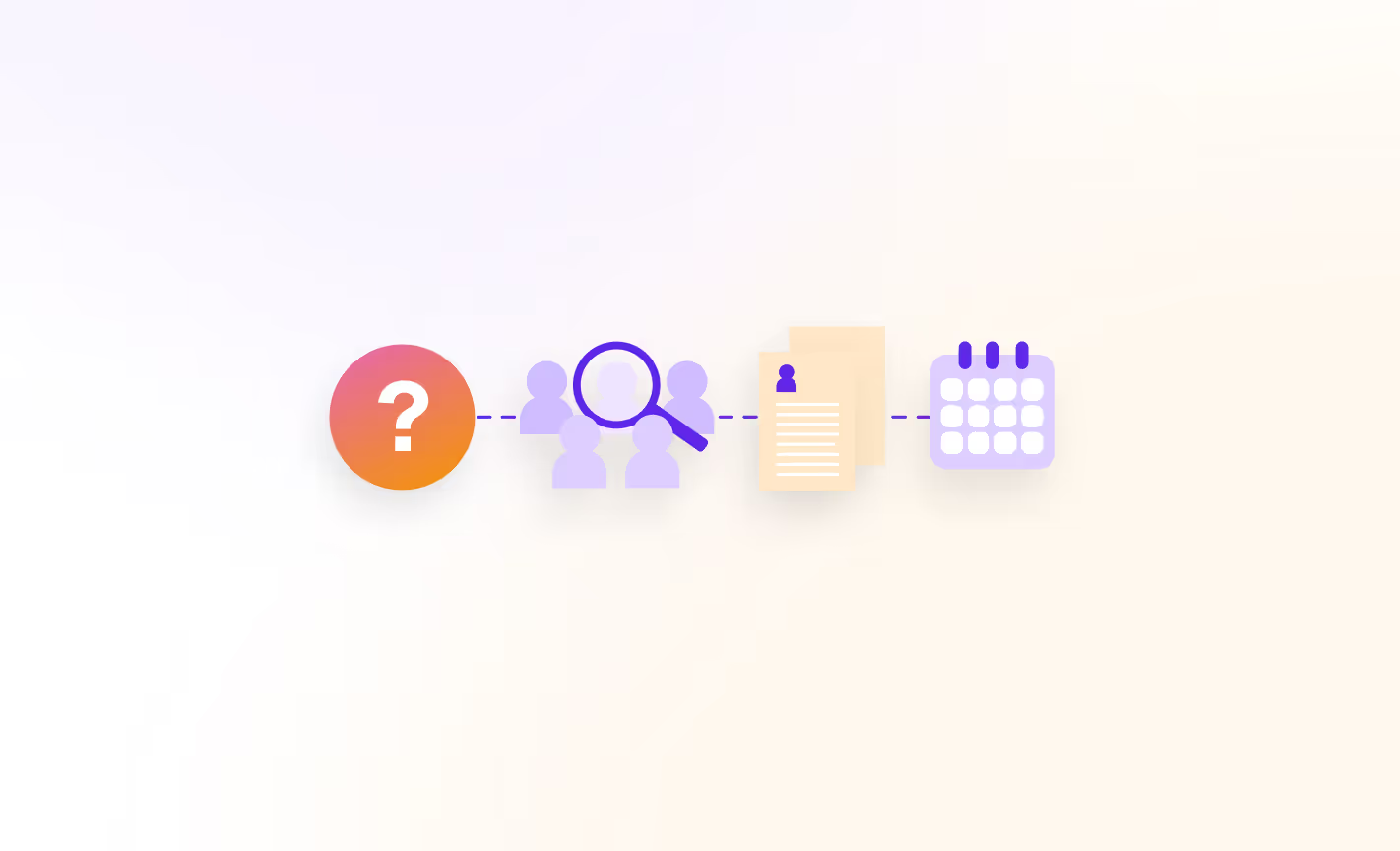We've all heard the hype: AI is the future of recruitment, poised to revolutionize the way we find top talent. But here's the dirty secret nobody's talking about: generic AI tools are a recipe for disaster.
Imagine trying to fill a niche engineering role with a resume screener designed for marketing positions. Sounds ridiculous, right?
Yet, that's exactly what companies are doing by deploying generic AI across their recruitment funnels.
Much like generic job description generators and resume parsers, this one-size-fits-all approach is not only ineffective, it can lead to biased hiring practices and a talent pool filled with mismatched candidates.
In this article, I'll dive into the dark side of generic AI solutions and explore why purpose-built recruitment AI technology is the key to unlocking true hiring success.
The delusion of one-size-fits-all AI
Let’s take Chat GPT as an example, as most of you have likely used it by now.
The notion that the same generic AI tool used to generate images and videos of futuristic cities can effectively evaluate candidates for roles as diverse as a brain surgeon and a social media manager is frankly laughable.
Just like a one-size-fits-all costume, generic AI-powered solutions applied to recruiting processes lack the necessary tailoring to truly understand the unique needs and requirements of different industries and positions.
A fast but dehumanized process
Much like a generic resume parser or job description generator, a generic tool like ChatGPT or Gemini can help you work faster. Such tools can detect keywords, understand the information read, and create content for you—standard job requirements and descriptions, standard interview questions, and so on.
But here's the thing: recruiting isn't just about scanning keywords on resumes, and it’s exactly this standardized approach and obsession with speed that has turned recruitment into the dehumanized process it is today.
With generic tools, whether AI-driven or not, all you get is generic output. It’s pretty much the same as using ready-made templates or evaluating a candidate based on fields found in an ATS only. It leads to a hiring experience that is dry, rushed, and far from candidate-centric.
The result is well-known: candidates refuse to engage with mass-outreach methods, they become numb to one-size-fits-all messages and standardized assessments, and want to feel that the recruiter understands them as individuals.
When they feel they're only a number, the human element of recruitment is lost.
Candidates crave personalized experiences and meaningful interactions that acknowledge their unique skills and contributions. Failing to provide this personal touch can result in disengagement, and in the tight job market we’re dealing with today, the last thing you want is to lose good candidates to generic algorithms.
Recruitment is much more than evaluating a candidate against a checklist of points and metrics. It's about identifying the specific skills, experience, potential, and cultural fit that make a candidate a perfect match for a specific role within a specific company.
It requires not just an understanding of industry jargon and niche skillsets, but also of the subtle nuances that separate the best candidates from the good ones.
Generic AI, with its broad strokes and one-dimensional approach, simply can't compete with the depth of knowledge and human intuition needed for successful recruitment.
Inherent bias and rigidity
Next to these, generic AI, trained on broad datasets, inherits biases from that data. Maybe the data favors specific keywords or educational backgrounds, unfairly overlooking equally qualified candidates. This can lead to a talent pool devoid of diversity, hindering innovation and company growth.
And finally, gen AI leaves little to no space for customization, forcing you to squeeze your unique recruitment needs into a rigid framework.
Your company might be a cutting-edge tech startup, while another focuses on traditional manufacturing. Generic AI wouldn't understand the nuanced differences between a "growth hacker" and a "master machinist." It might prioritize keywords irrelevant to your industry, leading you to miss out on top talent.
Does your company pride itself on a collaborative environment or a fast-paced, results-oriented culture? Generic AI can't assess these cultural nuances. You might end up with highly skilled candidates who simply wouldn't thrive in your unique work environment.
In essence, generic AI offers a blunt hammer approach to recruitment. It might get the job done superficially, but it lacks the precision and customization needed to truly build a dream team.
Why purpose-built recruitment AI is different
Unlike generic artificial intelligence, purpose-built AI recruiting software takes into consideration the context of your organization, or in the case of staffing agencies, of your clients. It adapts to your specific needs, offering a level of customization that generic solutions simply can't match.
AI recruiting tools are designed to understand your employer brand, your tone of voice, the values of your company, and the candidate profiles that best fit your company.
Purpose-built hiring AI can interpret data with this context in mind. So, when you're having interviews with candidates or intake calls with hiring managers, the AI will interpret the data through this filter.
So in short, purpose-built recruitment AI offers:
- Industry expertise: The AI models can be trained on industry-specific data, understanding the nuances of your field. It can identify relevant skills, experience, and even jargon, ensuring you attract the best talent within your unique sector.
- Company culture fit: By analyzing your company culture and values, purpose-built AI can assess whether a candidate would thrive in your environment. Imagine finding candidates who not only have the skills, but also perfectly fit your company's DNA!
- Skill set customization: Need a data analyst with a specific programming language expertise? Want a marketing manager with social media savvy? Purpose-built AI allows you to tailor your search criteria to each role, attracting candidates with the exact skillsets you need.
Let’s use some practical examples to make this more specific.
Recruitment AI use case examples
We’ll look at an intake call first, and a candidate interview after, to see how artificial intelligence purpose-built for hiring teams can assist you before, during, and after these calls.

Intake calls
- Before an intake call, AI software built for recruiting teams can go through a client’s website and job postings to understand their company profile, values, tone of voice, what makes a good hire, and what open positions they have.
- An AI recruiter workmate will then join you during the intake call, listen in to the conversation, take notes, and after the call, help you craft a job requirement draft that will match the manager’s input perfectly.
- Once this is done, the can follow up with the hiring manager to confirm the job requirements, post job openings on specific job boards, and start the candidate sourcing process - either in a talent pool or on platforms like LinkedIn.
- All the steps from sourcing and screening candidates to shortlisting potential candidates and scheduling the next steps in the hiring process can be taken over by AI. And unlike generic AI tools, recruitment AI software can work 24/7 for one client, with no human input - because recruitment AI has all the context it requires to work tirelessly in the background.

Candidate interviews
Same goes with the candidate interview process:
- If you’re sourcing, a recruitment AI tool can browse through talent pools to find the most qualified candidates for a specific role. It can check documents like resumes, social media profiles, past video interviews, past phone call recordings, and so on, and create a very detailed overview of the candidate.
- If the candidate is a good match, the AI can reach out by email or instant messaging, creating a personalized outreach message that takes into account the candidate’s profile.
- The AI can also offer the job seeker multiple time slots for an intro call and schedule interviews on your behalf, keeping the process very flexible and adjusting it to the candidate’s preferences in real time.
- Then, before the scheduled interview, the AI software handles the resume screening, checks the candidate’s social media profile and motivation letter, and compares the applicant’s profile with the job requirements document as well as with profiles of best performers or company culture docs.
- During the interview, the AI will take notes, evaluate the candidate experience and general presence, and “pay attention” to anything that might signal that the candidate isn’t a good match for the role. Nuances that might escape you, but might be easy to detect with the use of AI.
- Post-interview, the AI recruiter can handle the communication with the candidate for you, personalizing it and adapting the tone to fit the candidate’s personality. Moreover, the AI can populate the applicant tracking system with all the information needed, helping you make better-informed decisions.

Now, you might say that some or all of these things can be accomplished with regular automation and generic AI tools too. And it is true that a mix of automation and generic AI prompts can get you there.
But why would you waste time designing candidate journeys and workflows, hacking together connections between several tools, and writing page-long prompts for each and every client and each and every role, when you can get all this time-consuming work done for you with AI software built specifically for hiring teams?
The key to recruitment effectiveness: Human-AI partnership
We explained in a previous article our vision for the future of recruitment. We believe that autonomous recruitment powered by AI technology is the way to go, and we believe that for this to happen, true recruiter-AI synergy is required.
This means that human recruiters will be augmented, not replaced, by AI tools. And that’s because human judgment and intuition are irreplaceable in recruitment.
We believe the right way to adopt artificial intelligence in talent acquisition is to think of AI as a silent helper: A workmate that’s always ready, always willing to jump in and help, freeing recruiters' time for more strategic tasks like candidate nurturing or building relationships with clients.
We believe that in the future of TA, purpose-built recruitment AI will handle all the repetitive tasks - not just tasks that require manual effort and advance the process steps, but also more complex activities like candidate engagement, candidate-role fit assessments, or pipeline building.
By leveraging AI technology, recruiters can streamline processes, make more informed decisions, and ultimately, deliver a better experience for both candidates and clients.



.avif)



%20(1).avif)
%20(1).avif)